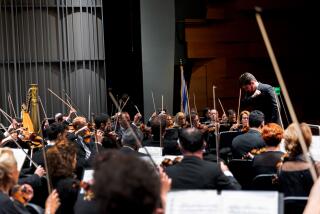Pianist Kovacevich Grapples With Beethoven
- Share via
Near the end of his recital in the Dorothy Chandler Pavilion Tuesday night, Stephen Kovacevich faced one of the more terrifying passages in all the piano literature. Two sets of fingers in the same hand must execute simultaneous trills, and that tintinnabulation must transcend all sense of effort and create an ethereal spell. But the gravest terror may be the psychological result of those technical and psychic challenges, the loneliness of the late-Beethoven player.
Crouched down on a low bench and stooped over the keyboard, Kovacevich musically rose to that extraordinary moment in Beethoven’s final piano sonata, Opus 111. His hands did their miraculous trilling. The sound was almost unreal. Up on the lonely stage, the pianist, his piano and the sound they produced all seemed one, another world into which we were offered a glimpse.
It was such lyrical, otherworldly moments that Kovacevich made the most memorable in his recital, which included the Sonata in A Major, Opus 101, and C Minor, Opus 111, the middle-period “Tempest” Sonata in D Minor, Opus 31, No. 2, and four of the Bagatelles, Opus 119.
One does not normally think of Kovacevich as an introverted pianist or visionary, which is how he appeared on Tuesday. A native Angeleno and longtime Londoner, he is most familiar as an elegant and relatively straightforward classicist who specializes in the traditional 18th and 19th repertory. In recent years, he has concentrated increasingly on Beethoven. His latest Beethoven sonata recordings on EMI have won wide praise; he is currently embarked upon a concert series in London called “Kovacevich, Beethoven and the Piano”; and he will return to the Chandler Pavilion to perform Beethoven’s First Piano Concerto with the Los Angeles Philharmonic tomorrow through Sunday.
Yet for all Kovacevich’s evident involvement with Beethoven’s world, and for the stunning calmness that he brought to the more lyrical elements of the works, the composer is just as noted for his storminess as for his transcendence, and Kovacevich’s playing was not without struggle. The pianist has a world-class technique, and sometimes he seemed to have almost too much of it. When the music was fast and loud, it appeared almost to get away from Kovacevich, as he sped up in a headlong rush, then caught himself.
The sensation became one, then, of curious struggle, as if the pianist were letting Beethoven’s most Romantic impulses out of the Classical box, but then calming down and carefully putting everything back in. Although the acceleration and the sheer virtuosity brought a certain drama on their own terms, this was not exactly dramatic playing where vision is won through struggle. Rather it seemed Kovacevich began with the vision and then fought to keep it as the composer forced him through a tortuous course of action.
And that, perhaps, is what also created that sensation of loneliness. Given the purity of tone that Kovacevich found in the opening and the slow movement of the “Tempest,” the inner peace he brought to the flowing opening of Opus 101 and the angelic sweetness of his trilling up the keyboard in the final pages of Opus 111, he seemed a pianist in search of escape. Opus 111 ends, after all that unleashing of miraculous sound, with a soft, quick, almost casual Classical cadence, an unremarkable C major chord flipped off at the end. Kovacevich played it with extraordinary grace that was anything but unremarkable. He was clearly glad to be home.
More to Read
The biggest entertainment stories
Get our big stories about Hollywood, film, television, music, arts, culture and more right in your inbox as soon as they publish.
You may occasionally receive promotional content from the Los Angeles Times.











